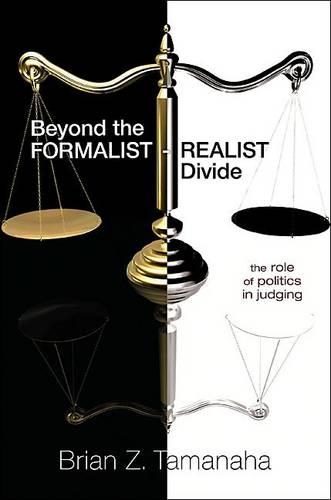
Beyond the Formalist-Realist Divide: The Role of Politics in Judging
(Paperback)
Publishing Details
Beyond the Formalist-Realist Divide: The Role of Politics in Judging
By (Author) Brian Z. Tamanaha
Princeton University Press
Princeton University Press
25th January 2010
United States
Classifications
Tertiary Education
Non Fiction
Legal systems: judges and judicial powers
Judicial review
347.012
Physical Properties
Paperback
264
Width 152mm, Height 235mm
340g
Description
According to conventional wisdom in American legal culture, the 1870s to 1920s was the age of legal formalism, when judges believed that the law was autonomous and logically ordered, and that they mechanically deduced right answers in cases. In the 1920s and 1930s, the story continues, the legal realists discredited this view by demonstrating that the law is marked by gaps and contradictions, arguing that judges construct legal justifications to support desired outcomes. This often-repeated historical account is virtually taken for granted today, and continues to shape understandings about judging. In this groundbreaking book, esteemed legal theorist Brian Tamanaha thoroughly debunks the formalist-realist divide. Drawing from extensive research into the writings of judges and scholars, Tamanaha shows how, over the past century and a half, jurists have regularly expressed a balanced view of judging that acknowledges the limitations of law and of judges, yet recognizes that judges can and do render rule-bound decisions. He reveals how the story about the formalist age was an invention of politically motivated critics of the courts, and how it has led to significant misunderstandings about legal realism. Beyond the Formalist-Realist Divide traces how this false tale has distorted studies of judging by political scientists and debates among legal theorists. Recovering a balanced realism about judging, this book fundamentally rewrites legal history and offers a fresh perspective for theorists, judges, and practitioners of law.
Reviews
"Tamanaha has written a provocative challenge to conventional wisdom about the rise of judicial realism... Strongly recommended for scholars and students of law, political science, and history."--Choice "Beyond the Formalist-Realist Divide is a clearly written and groundbreaking book. Although its focus is historical, its objective--in which it succeeds--is to change the way we think about law today."--Henry Cohen, Federal Lawyer "Tamanaha's book reflects some striking research into the views of (largely forgotten or neglected) 19th-century law professors and jurists, and the material he has brought to our attention will demand attention from legal historians... [W]e should be grateful to Tamanaha for his provocative historical research, for laying down a vigorous challenge that should be met by historians of ideas and social scientists, and for imparting appropriate intellectual caution and modesty to future writers who might otherwise be prone to casual talk about a 'formalist' age in American legal thought."--Brian Leiter, Legal Theory "Tamanaha's ... book will change the way we think about both formalism and realism, about the history of legal scholarship and about the empirical study of judicial decision making."--Edward Rubin, Law and Politics Review
Author Bio
Brian Z. Tamanaha is professor of law at Washington University School of Law. His books include "On the Rule of Law and Law as a Means to an End".
